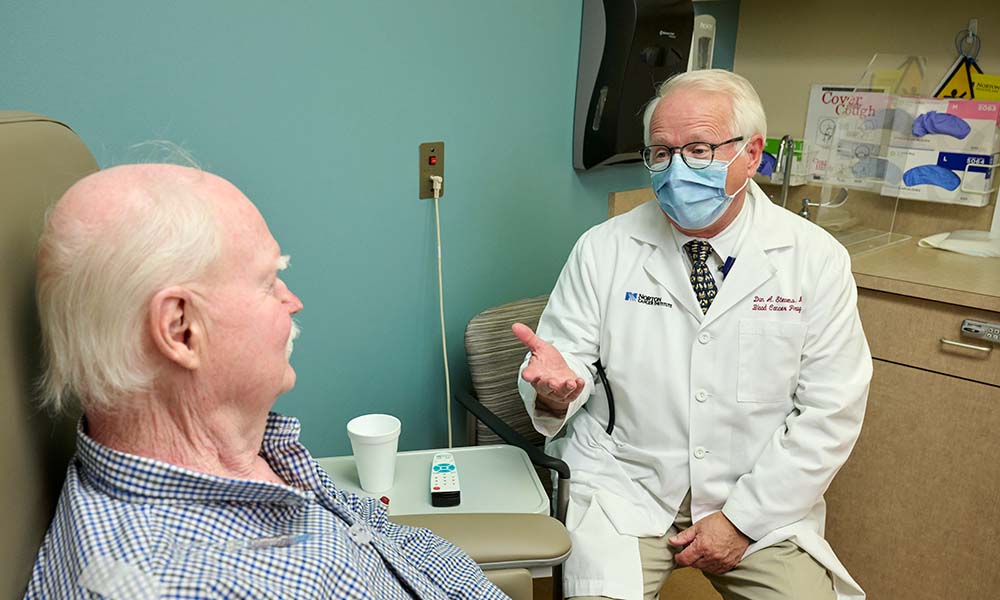We have nearly 50 ongoing trials available to patients with multiple myeloma, lymphoma, Hodgkin lymphoma or leukemia. We have even more trials that are still underway, but for which we’ve finished recruiting patients.

At Norton Cancer Institute, we are committed to giving our patients the opportunity to receive state-of-the-art, cutting-edge therapies. This is made possible because of the long-standing support of clinical trials by Norton Healthcare’s leadership and board of trustees.
I specialize in blood cancers. Currently we have nearly 50 ongoing trials available to patients with multiple myeloma, lymphoma, Hodgkin lymphoma or leukemia. We have even more trials that are still underway, but for which we’ve finished recruiting patients.
When we choose which trials to join, we look for different mechanisms of action, drugs that are targeted, and/or those that use the body’s own immune system to attack cancer cells.
One trial I’m very excited about uses a type of therapy called bispecific T-cell engaging antibodies, for myeloma and lymphoma patients. We’ve seen amazing responses in patients who have failed with five, six, seven other treatments. These antibodies are called bispecific because they have two “hands.” With one hand they grab cancer cells while the other grabs cancer-killing T-cells. These drugs bring the patient’s own immune system to bear on the cancer.
The results of this clinical trial are not published yet, but this looks like a very promising therapy would represent a real advance in cancer care.
Cellular therapy is another area where we are very active both with Food and Drug Administration (FDA)-approved cells and those still in trials. With cellular therapy, a patient’s cells are removed, bioengineered to attack cancer cells and then infused back into the patient. We’re also looking at allogeneic cells, using cells from a normal donor. These “off the shelf” cells provide us yet another way to harness the immune system to attack cancer cells.
At Norton Cancer Institute, we participate in studies ranging from early phase 1 trials to randomized phase 3 trials. The phase 1 trials are more investigational therapies, in earlier stages of development, and can be an option for people who have exhausted FDA approved treatments.
Established expertise with new medications
In addition to giving our patients access to drugs that may be years from FDA approval, our physicians, nursing staff and pharmacy staff become familiar with these drugs years before they are commercially available. Once they are approved by the FDA, our health care providers already have expertise with these medications.
As a sign we’re at the forefront of cancer research and gaining valuable experience with drugs that could become the standard of care, studies in which we’ve been participants are part of the scientific literature in some of the world’s most prestigious journals.
Refer a patient
To refer a patient to Norton Cancer Institute, visit Norton EpicLink and open an order for Oncology.
Last year, I was co-author on a phase 2 study of fimepinostat, a first-in-class inhibitor of histone deacetylase and phosphatidylinositol 3-kinase, for patients with relapsed/refractory diffuse large and high-grade B-cell lymphoma. The paper was published in the British Journal of Haemotology.
In January 2016, I co-authored an article in The Lancet looking at a trial to determine how well daratumumab, a monoclonal antibody, worked in patients with multiple myeloma. The drug now has FDA approval.
In December 2015 the findings of a trial on chronic lymphocytic leukemia (CLL), in which we took part, were published in The New England Journal of Medicine. The study compared how well two medications, ibrutinib and chlorambucil, worked in people over age 65 with CLL or small lymphocytic lymphoma.
I’ve been an oncologist for more than three decades, and this is the most exciting time in my career. What we have learned about the molecular biology of cancer over the last 20 or so years is finally showing benefits at the bedside.
Today’s standard of care is only possible because of clinical trials. At Norton Cancer Institute, we’ve been part of that advance in understanding of blood cancers and how to treat them.
Until we are curing every patient, we need to continue to look for more effective, more tolerated therapies. At Norton Cancer Institute, we’re committed to doing just that.
Don A. Stevens, M.D., is director of the Norton Cancer Institute hematologic cancer program.

